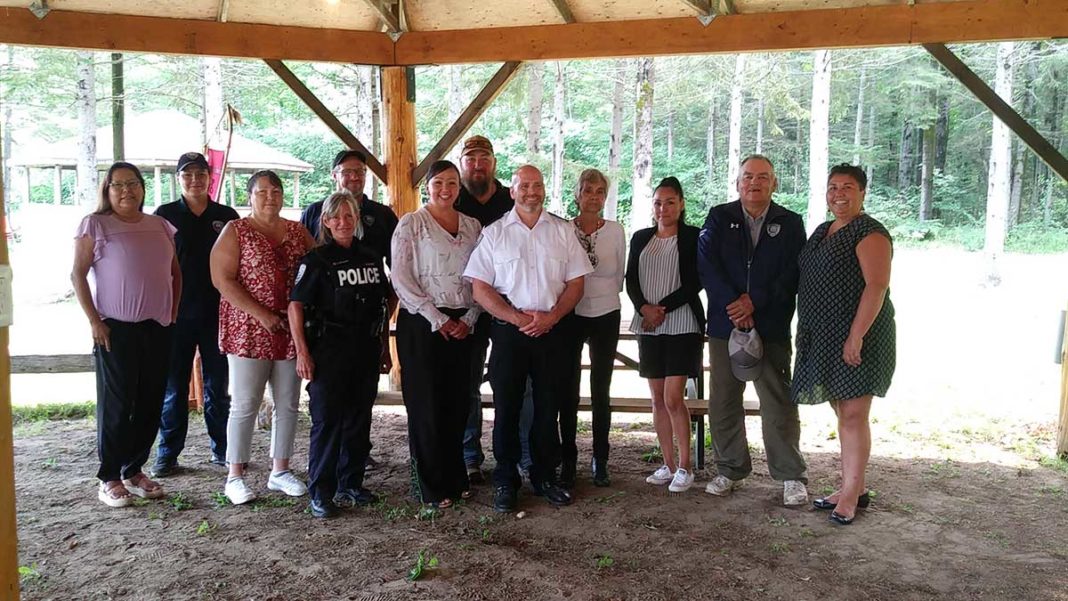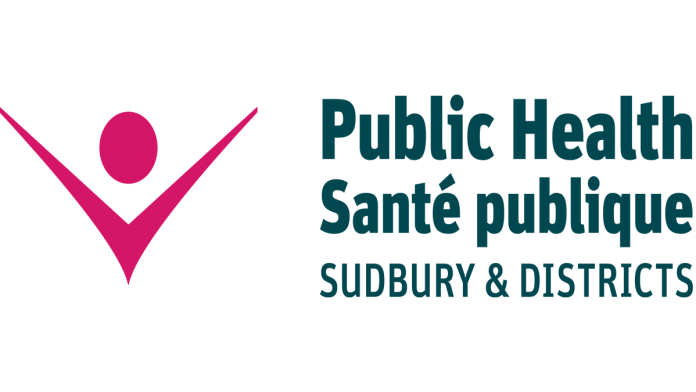SHESHEGWANING – An annual general meeting (AGM) provides an opportunity to look back on an organization’s past year. The UCCM Anishnaabe Police Service recently hosted its 25th AGM in the community of Sheshegwaning. Policing during a pandemic meant additional challenges for the service even as the communities serviced by UCCM Police continued to face an overwhelming opioid crisis, equity issues, mental health issues and intergenerational trauma. New leadership, staff and commission members will oversee the continued growth and development of the service into a future that includes safe communities, relationship building, new youth and other social programs, and peer support for officers and staff.
“Every one of us from the smallest child to the oldest adult has a vested interest in our service so that we can live safe, healthy, happy lives and reside in our communities without fear of violence or drugs or anything of that nature,” said Derek Assiniwe, commission chair, in his welcoming remarks. Mr. Assiniwe has been a commission member on and off for several years and was elected chair in 2021. It has been a somewhat overwhelming learning experience, he said, but also motivating. “I found it interesting to see actually how far our reach was and how we help a lot of people.”
The commission is always trying to build on relationships with its employees as well as business partners and other organizations, Mr. Assiniwe said. “Our training is always ongoing so we can provide a better service to the organization we have been elected to represent. I think that has always been our view, our mission, that we do things the right way to the best of our ability. That’s not to say things will always be easy. That’s not to say we’ll always do the right thing but we do our best to look at everything. It’s been an honour to sit with the other commission members as well as represent the organization.”
UCCMM Tribal Chair Patsy Corbiere thanked everyone who is involved with the police service on behalf of the Tribal Council. “It’s been actually a bad year, with COVID, the opiate overdoses and deaths in our communities. Thanks to the people who have been stepping in: the acting chief, Inspector Cori Slaughter, the people in the office, the social navigator.” The drug issues are moving forward and, “we’re finally addressing the stress on the officers. You can see it in their faces when talking to them.”
Community members need to support the police service, she said. “It’s one of our community organizations and it’s just like all the other organizations we have. There’s a lot of negativity towards them. We need to stand together. Being in silos is part of the problem and is not fixing anything.”
She referred to rumours rampant in some communities. “People need to stop blaming everybody else for what’s going on. The onus is on community members and leadership. We run for chief and council to build community wellness.” Facebook is the worst thing, she continued. “It’s a tool that is used to discriminate and to badmouth people like us when we’re trying to build community and wellness. One little thing happens and it’s all over Facebook. Unless you have something positive to say about people, don’t put it on Facebook.”
What is needed is to listen to the elders and to communities, she said. “We hope that things are going to get better and in the last couple of months, we’re starting to see people are happy again. Moving forward, we have to work together as a team to build healthy communities or we’re going to fall apart.”
In his annual report, Acting Chief Killeen also referred to Facebook as a divisive factor within the community and one that directly impacts officers. For example, there was a complaint posted on Facebook that it took four hours for officers to respond to a rock thrown through a window. At the time, officers were working with a person with mental health issues, to prevent it from escalating into a crisis. “The emergency stopped after the rock was thrown through the window,” he explained. “Police can’t respond immediately when there’s only two officers.” The couple whose house had been damaged understood the delay when the situation was explained to them but they didn’t go back onto Facebook to say everything was okay. “That causes a lot of negativity about our officers and our service. There’s a massive amount of stress on officers,” he said. “They’re expected to do a lot but with only a few personnel.”
Several Sheshegwaning residents stated they often felt forgotten by the police. “We’re remote, off the beaten path,” one resident said. “We’d like to see an increase in patrols. There’s a lot of drunk drivers.” Acting Chief Killeen replied that the service is pushing for more funding to hire additional officers. “It’s not only a First Nations or UCCM policing problem,” he said. “It’s across the Island, the province and even the country.”
It’s also a circular issue. Many officers are off duty on sick leave due to mental health concerns. A Sagamok detachment of the Anishnabek Police Service has no officers working there for this reason, Acting Chief Killeen noted. “The OPP from the Manitoulin-Espanola detachment are covering Sagamok. UCCM is covering the OPP calls. Wikwemikong Tribal Police Service is constantly asking for our officers to work overtime to fill in. Everyone is hurting. When personnel is short, there’s a ripple effect.”
“We have to lobby for more funding,” he said. “We have to show that we need more people. What we’re experiencing, the OPP are also experiencing. This is not the way it’s supposed to work. We’re not supposed to back up OPP, they’re supposed to back us up. We can’t effectively do the work we’re supposed to do. It sounds like excuses but it’s what we’re dealing with.”
The resident responded, “I understand that but it doesn’t help us. What can we do?”
Acting Chief Killeen said he can have officers do more patrols in the remote communities and the service is currently looking into substation options. He also explained that community members need to make the calls to the police station or 911 rather than calling their chief or band office. Funding is based on a formula that takes into consideration the number of calls for service.
“I also want to clear something up,” he said. “There’s a misunderstanding about search warrants and when we can act on information. If someone is present where something illegal is or was occurring, and that person reports the activity to police, police can act and obtain a warrant. “If you’re reporting something you’ve heard second or third hand, we’d be asking a judge to violate someone’s privacy. We need direct information in order to have the authority to act.”
Acting Chief Killeen came to UCCM Police with 23 years experience, 22 of those with the Greater Sudbury Police Service. The majority of my career was in drug investigation, intelligence and organized crime. “I saw that there was a need for me to come here to try and help combat that problem.”
He became acting chief of police unexpectedly after one month and has had to adapt to a pandemic lockdown, funding realities, new rules and regulations. He wants to concentrate less on enforcement and more on helping people get the help they need. That means internally as well: the mental health and wellness of police officers and civilian staff is important, he said. One action he’s taking is implementation of a peer support program.
Looking ahead, he said, “We need to work on mental health, keeping our communities safe, and updating training for both our officers and civilian staff.” A consultant has been hired to update policies and procedures. There will be more body cameras as well. “Our problems aren’t unique, they’re the same everywhere you go. I’ve worked in joint force operations with different police services across the province, even across the country. They’re the same problems. There’s no difference. We need to work on internal and external issues.”
Community members who attended the AGM also heard opening prayers from commission Elder Bill Antoine, welcoming remarks from Sheshegwaning First Nation Chief Dean Roy and a financial report by KPMG auditor Paul Pidutti. Social Navigator Daughness Migwans presented an overview on the social navigator initiative, including the Lighting the Fire Within pilot program. Inspector Cori Slaughter rounded out the event with a parable and a lesson. Not to be forgotten was the amazing lunch catered by Sheshegwaning’s Randi’s Snack Shack.
The full 2020-2021 UCCM Anishnaabe Police Service Annual Report will be available on their website uccmpolice.com.





